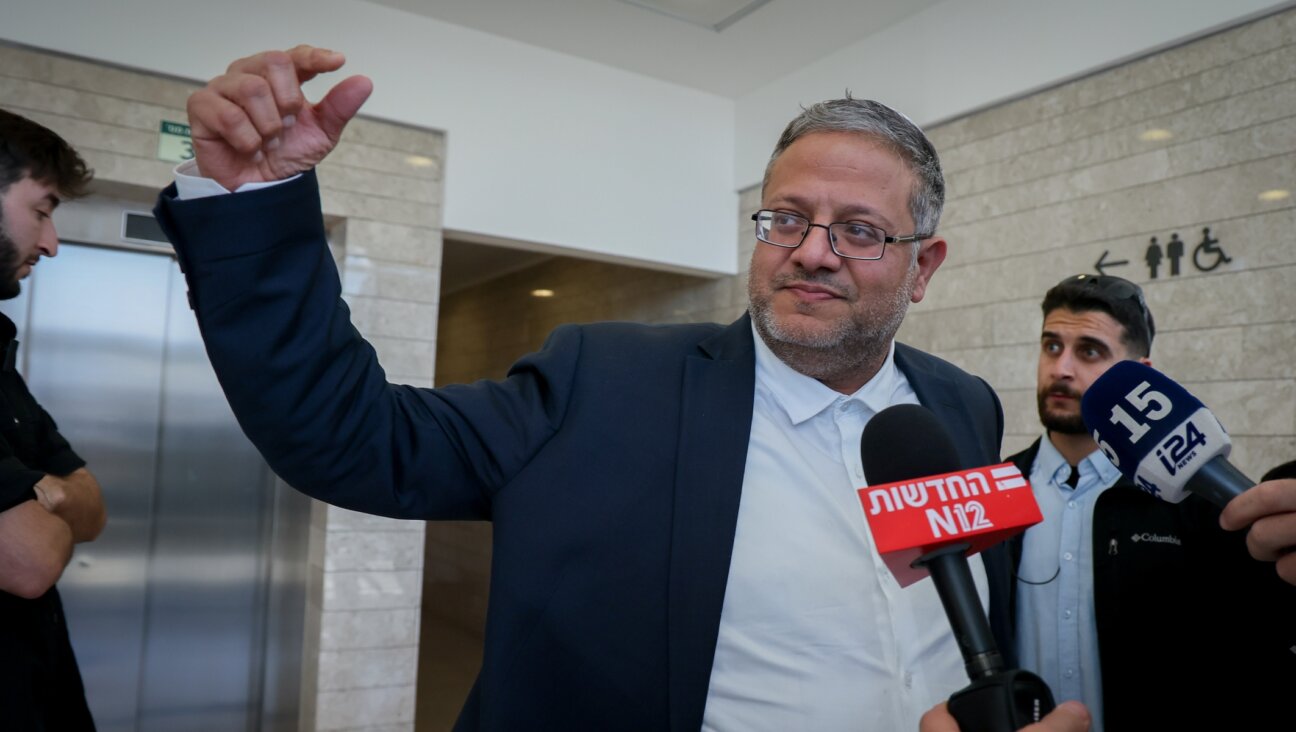Labor Unrest in Israel’s Foreign Service Is Felt in Capitals Around the Globe

Travel Limited: The work slowdown has had many repercussions, forcing leaders Angela Merkel (left) of Russia and Dmitry Medvedev (center) of Germany to cancel visits to Israel. Tzipi Livni (right), head of the opposition Kadima party, also had to call off a trip to South Africa. Image by Getty Images
If Israelis are feeling increasingly internationally isolated, it is not only the result of pro-Palestinian sentiment overseas. Lately, it is also due to the work slowdown declared by Israel’s foreign service, a new phase in the diplomats’ ongoing struggle for higher wages and more funding.
The results of this labor dispute are becoming increasingly visible: Visits of foreign heads of states to Jerusalem have been canceled, calls from foreign ministries to Israeli embassies overseas go unanswered and travelers seeking visas to go to Israel find closed doors at the Israeli consulates.
The struggle, Israel’s career diplomats say, is not only about money but also about recognition. In a country where the military establishment takes primacy over the foreign service, it is sometimes difficult to make the case that diplomacy is key to the national interest.
The Foreign Ministry’s labor union, which represents all foreign-service career diplomats and administrative support workers, decided last month to limit diplomatic activity as an act of labor sanctions. Ever since, Israeli diplomacy has been plunged into disarray.
Under union orders, Foreign Ministry employees in Jerusalem and diplomats at the embassy in Moscow refused to make arrangements for a planned visit to Israel by Russian President Dmitry Medvedev. The visit, considered highly significant in light of the critical role Russia could play in hindering Iran’s nuclear program, was canceled. Instead, Medvedev limited his visit to the West Bank.
Similarly, German Chancellor Angela Merkel was forced to cancel a planned visit, as was India’s foreign minister. A trip to South Africa by Israeli opposition leader Tzipi Livni was also postponed, with leaders of South Africa’s Jewish community publicly expressing frustration over this state of affairs.
The dispute is also being felt in run-of-the-mill, daily diplomatic work. Israel’s ambassador to Brazil, Giora Becher, said he has put off diplomatic work intended to counter Arab League efforts to get more Latin American nations to recognize an independent Palestinian state. Becher also pointed to his overstretched diplomatic mission in Brazil as a sign of the need for more foreign-service funding. His embassy in Brasilia has only three diplomats — two dealing with political issues and one in charge of consular affairs — who are expected to maintain ties with one of the world’s fastest-growing powers. “There’s just so much you can do with a political team of two diplomats,” Becher said.
The labor sanctions are also being felt in Washington, Israel’s largest and most prestigious diplomatic posting. Diplomats in Washington were instructed by the union to stop all contact with the State Department. “We informed the State Department that we are in a struggle for the strengthening of Israel’s foreign service,” said embassy spokesman Jonathan Peled. He added that there is a “certain decrease” in the level of coordination and conversation with the Obama administration due to the labor sanctions. Other diplomats, however, explained that since other Israeli government offices — including those dealing with the military, police, trade, economy and agriculture — have their own representatives in Washington, the overall effect is more limited than in other countries.
Diplomats in all embassies were also instructed to stop all coordination with other Israeli government ministries, thus putting Israel’s diplomacy related to trade, economics and security on hold.
The dispute has also practically shut down all consular services for the past month except for emergency cases. The embassies are not providing services for Israelis abroad and are not issuing tourist visas.
Labor unrest in Israel’s foreign ministry increased in the past year, reaching a climax last August when foreign-service workers threatened to prevent Prime Minister Netanyahu from coming to Washington for the launch of direct peace talks with the Palestinians. Diplomats returned to work after receiving a promise that their claims would be heard, but in December they began labor sanctions again, arguing that negotiations with Israel’s Finance Ministry were leading nowhere.
“There is an enormous erosion in the salary of diplomats which has not been corrected in years,” said Noam Katz, minister for public diplomacy at the Israeli embassy in Washington.
Katz, who previously served as ambassador to Nigeria, said the erosion is felt mainly in the United States, where diplomats face high costs of living. “The way things worked for years was that you could save a little money when you’re abroad and that made up for the hunger wages you got when returning home,” he said, adding that now diplomatic salaries abroad are hardly enough to live decently.
As a result, filling diplomatic posts at the embassy in Washington, once considered the crown jewel of Israel’s foreign service, has become increasingly difficult. Several recent vacancies for top diplomatic jobs in Washington had applications from only one or two candidates, while less important posts in cities such as Bratislava or Helsinki saw dozens of applicants, partly due to the fact that salary scales for positions in Europe have been updated more recently than for those in America.
Yaacov Livne, a member of the Foreign Ministry’s labor union, said that the number of Israelis who want to enter the foreign service is dwindling.
“The ministry was always known for setting a very high bar, and it is becoming increasingly difficult to maintain this bar,” he said.
The low wages, several Israeli diplomats said, are a sign of the lack of appreciation Israelis have for their foreign service. “People think we only do hasbara and take care of Israelis who get in trouble abroad,” Katz said, using the Hebrew word for public relations. “They don’t see us as part of the national security system.”
In part, this is a result of the unique Israeli tradition, in which high-priority issues — especially those relating to ties with Washington — are dealt with by the prime minister and his advisers, who often bypass the foreign ministry professionals.
But while the partial labor sanctions succeeded in bringing some attention to the grievances of foreign-service workers, some aspects of Israeli diplomacy are continuing to function.
Political appointees, such as Israel’s ambassador to America, Michael Oren, are not part of the labor dispute and are continuing their work as usual. Foreign Ministry employees’ labor sanctions were also undercut last August when their colleagues from the Mossad, Israel’s foreign intelligence service, agreed to prepare Netanyahu’s visit to Greece, bypassing the local foreign-service workers.
But it is also the diplomats themselves who are reluctant to completely shut down Israel’s foreign service. Important diplomatic issues are still being addressed, and the consular branch has made numerous exceptions to accommodate Israelis in need, including travelers stuck in Tunisia during the recent unrest there.
“We became diplomats because we believe in what we do,” Peled said. “Taking these steps is against our nature.”
Contact Nathan Guttman at [email protected]
The Forward is free to read, but it isn’t free to produce

I hope you appreciated this article. Before you go, I’d like to ask you to please support the Forward.
Now more than ever, American Jews need independent news they can trust, with reporting driven by truth, not ideology. We serve you, not any ideological agenda.
At a time when other newsrooms are closing or cutting back, the Forward has removed its paywall and invested additional resources to report on the ground from Israel and around the U.S. on the impact of the war, rising antisemitism and polarized discourse.
This is a great time to support independent Jewish journalism you rely on. Make a Passover gift today!
— Rachel Fishman Feddersen, Publisher and CEO
Most Popular
- 1

News Student protesters being deported are not ‘martyrs and heroes,’ says former antisemitism envoy
- 2

News Who is Alan Garber, the Jewish Harvard president who stood up to Trump over antisemitism?
- 3

Fast Forward Suspected arsonist intended to beat Gov. Josh Shapiro with a sledgehammer, investigators say
- 4

Politics Meet America’s potential first Jewish second family: Josh Shapiro, Lori, and their 4 kids
In Case You Missed It
-

Opinion Why can Harvard stand up to Trump? Because it didn’t give in to pro-Palestinian student protests
-

Culture How an Israeli dance company shaped a Catholic school boy’s life
-

Fast Forward Brooklyn event with Itamar Ben-Gvir cancelled days before Israeli far-right minister’s US trip
-

Culture How Abraham Lincoln in a kippah wound up making a $250,000 deal on ‘Shark Tank’
-
Shop the Forward Store
100% of profits support our journalism
Republish This Story
Please read before republishing
We’re happy to make this story available to republish for free, unless it originated with JTA, Haaretz or another publication (as indicated on the article) and as long as you follow our guidelines.
You must comply with the following:
- Credit the Forward
- Retain our pixel
- Preserve our canonical link in Google search
- Add a noindex tag in Google search
See our full guidelines for more information, and this guide for detail about canonical URLs.
To republish, copy the HTML by clicking on the yellow button to the right; it includes our tracking pixel, all paragraph styles and hyperlinks, the author byline and credit to the Forward. It does not include images; to avoid copyright violations, you must add them manually, following our guidelines. Please email us at [email protected], subject line “republish,” with any questions or to let us know what stories you’re picking up.












